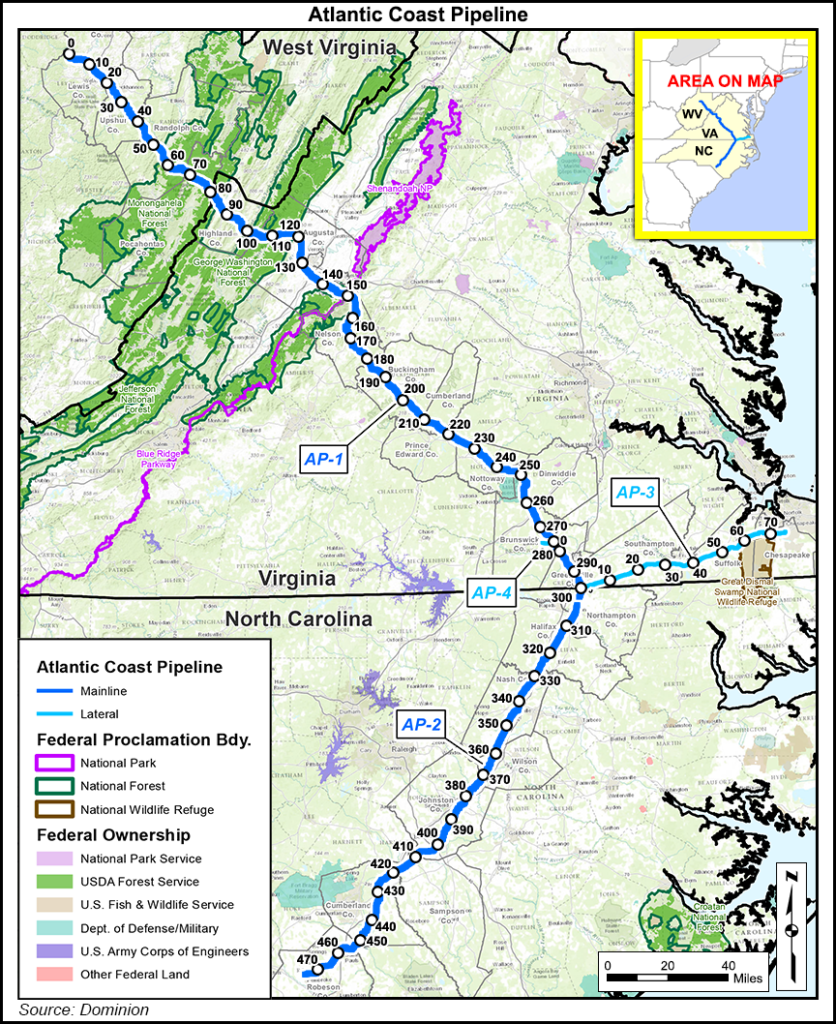Dominion Survey Finds High Level of Support For Atlantic Coast Pipeline Project
Nearly 28,000 comments on the proposed Atlantic Coast Pipeline (ACP) were filed at FERC during a recent 60-day scoping period, 82% of them in support of the project, according to an analysis prepared for the project’s backers by Natural Resource Group.

The bulk of the comments (21,896) came from non-governmental organizations (NGO) and were favorable, according to the 100-page report, which was filed by Dominion Transmission Inc. on behalf of Atlantic Coast Pipeline LLC (PF15-6) in the early stages of the review process. Most of the opposition to the project came from environmental non-governmental organizations (ENGO), which were the source of 3,260 comments, all but three of them filed in opposition to the proposed pipeline.
While the number of affected landowners who commented on the project was relatively small (479), 95% of them said they oppose the project, with just 2.5% supporting it.
The top issues identified by elected officials, business civic organizations, NGOs and the general public focused on economic factors, including employment opportunities, while affected landowners and ENGOs focused their comments on safety, alternatives, waterbodies and water supplies.
Dominion, Duke Energy, Piedmont Natural Gas and AGL Resources are backing the $4.5 billion project, which was announced last year (see Daily GPI, Oct. 31, 2014; Sept. 2, 2014). Atlantic Coast would run 550 miles from Harrison County, WV, southeast through Virginia with an extension to Chesapeake, VA, and then south through eastern North Carolina to Robeson County. The main pipeline would be 42 inches in diameter in West Virginia and Virginia, reducing to 36 inches in North Carolina.
The pipeline would help meet growing gas demand in Virginia and North Carolina by providing direct access to production in the Marcellus and Utica shales of West Virginia, Pennsylvania and Ohio.
Mindful of the growing protest to pipeline projects, the Dominion report responds to dozens of concerns put forward by commenters, including questions about the demand for natural gas within the Dominion footprint.
“Demand for natural gas in Virginia and North Carolina is expected to increase in coming decades due to a combination of population growth and displacement of coal-fired electric power generation,” according to the report. “The ACP is not designed to export natural gas overseas; it is not a component of the purpose and need of the projects. It should further be noted that there are no licensed terminals to export liquefied natural gas in either Virginia or North Carolina.
On Monday, Atlantic Coast Pipeline said it had identified several alternate route segments “as potentially having the least impact to environmental, historic and cultural resources and they are being incorporated into the proposed route” of the pipeline.
“While we have not surveyed them yet, we have determined there are several alternate segments that may have less of an impact than the initially proposed route,” said Leslie Hartz, vice president of pipeline construction for Dominion Transmission Inc. “Surveying is necessary to determine the final route.”
The identified alternate segments — the Augusta Industrial Park variation, the Appalachian Trail South alternate, the East of Lovingston Connector alternate and the East of Lovingston alternate — are in Augusta and Nelson counties in Virginia. Detailed information will be presented in the drafts of 12 resource reports that will be filed at FERC this month and a final proposed route will be included in a formal FERC application later this summer, the company said.
A study commissioned last year by the four utility companies behind the project concluded that construction and operation of the ACP would have a significant economic impact in West Virginia, Virginia and North Carolina (see Daily GPI, Dec. 2, 2014).
A Williams outreach coordinator recently described to NGI the advance community work Williams is doing in support of its very large Atlantic Sunrise project, an expansion of the Transcontinental Gas Pipeline LLC system. For large projects the company puts together an outreach team which works together to establish community relations throughout the years it takes to move the project through the regulatory system. The efforts are aimed at the growing protests the industry is facing across the country (see Daily GPI, May 8).
© 2024 Natural Gas Intelligence. All rights reserved.
ISSN © 1532-1231 | ISSN © 2577-9877 |
